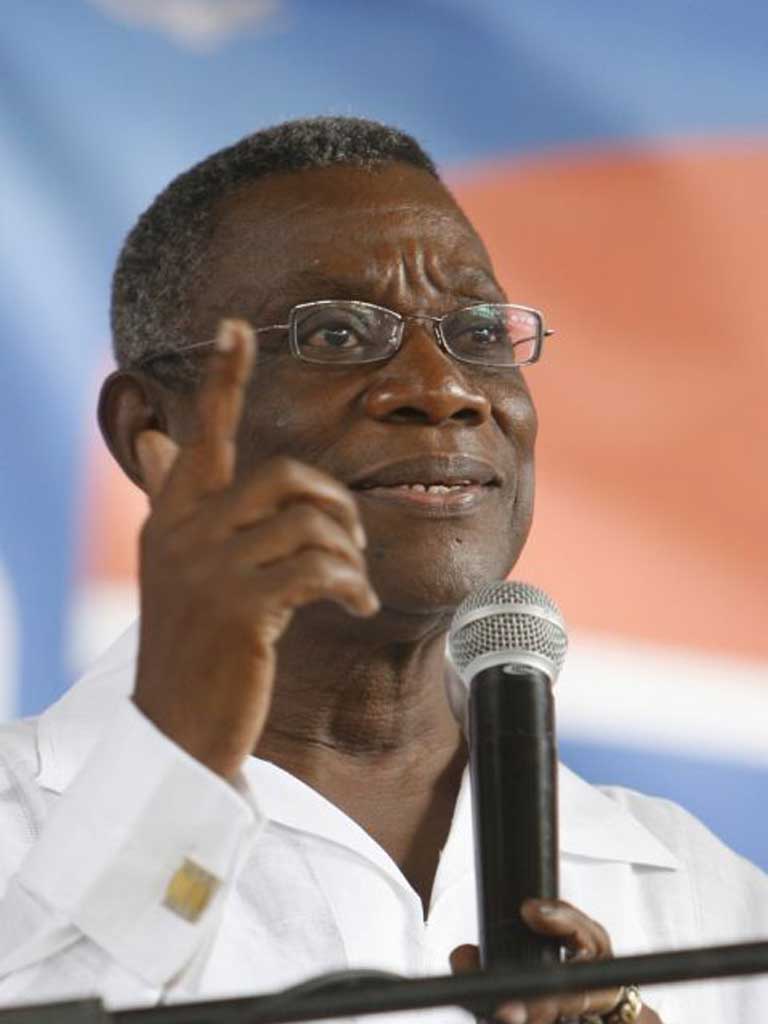John Atta Mills: Politician who helped secure democracy in Ghana

Your support helps us to tell the story
From reproductive rights to climate change to Big Tech, The Independent is on the ground when the story is developing. Whether it's investigating the financials of Elon Musk's pro-Trump PAC or producing our latest documentary, 'The A Word', which shines a light on the American women fighting for reproductive rights, we know how important it is to parse out the facts from the messaging.
At such a critical moment in US history, we need reporters on the ground. Your donation allows us to keep sending journalists to speak to both sides of the story.
The Independent is trusted by Americans across the entire political spectrum. And unlike many other quality news outlets, we choose not to lock Americans out of our reporting and analysis with paywalls. We believe quality journalism should be available to everyone, paid for by those who can afford it.
Your support makes all the difference.The ascension of John Atta Mills to the presidency of Ghana in 2008 went a long way to consolidating democracy in the country. Following Mills' defeat to John Kufuor in the 2001 election, it was the second time power had been transferred from one legitimate leader to another, an indicator of stability.
He gained a reputation as a man of peace, though many Ghanaians were horrified at the tone of public discourse introduced on radio and television shows by his more rabid propagandists. He served as president as Ghana began grappling with how to deal with its new-found oil wealth from offshore fields discovered in the last five years.
Mills, who had been suffering from throat cancer, owed his elevation to a quirk of circumstance. In 1996, he had been working in Accra as Commissioner of Income Tax when the country's ruler of the time, Flight-Lieutenant Jerry Rawlings, quarrelled violently with his vice-president, Kow Arkaah, at a Cabinet meeting.
Searching for a new vice-president, Rawlings remembered an audience he'd had with Atta Mills, and the good impression he'd made, and invited Mills to step up. When Rawlings finished his two terms, he persuaded his party, the National Democratic Congress (NDC), to adopt Mills.
Mills was defeated twice, in 2000 and 2004, by the National Patriotic Party (NPP) candidate John Kufuor, but despite being mocked as "unelectable", tried his luck a third time, in 2008. Kufuor's two terms were up and Mills faced Nana Addo Dankwa Akufo Addo. The election went to a run-off ballot which, to the astonishment of many, Mills won, albeit by a tiny margin, with 50.23 per cent of the vote.
Mills was a quietly spoken man with a professorial manner, but his mien was deceptive: his work at the Income Tax Department had taught him much about human nature, and although he was humble and kindly, he had an inner steel. He needed all of it to resist Rawlings' attempts to get him to stand down as NDC candidate in the forthcoming December 2012 election in favour of his wife, the former First Lady Nana Konadu Agyeman Rawlings. The "politically naive" ex-professor had effectively wrested control of the NDC from its founder.
John Evans Atta Mills was born at Tarkwa, in the west of Ghana, in 1944. He read law at the University of Ghana, Legon, then obtained a doctorate at the School of Oriental and African Studies in London. A keen sportsman, he had played for the Ghana national hockey team.
After a Fulbright Scholarship at Stanford Law School, Mills became a lecturer at the Faculty of Law at the University of Ghana, Legon. He spent nearly 25 years there and at other institutions, rising to associate professor. He was Acting Commissioner of Ghana's Internal Revenue Service 1986 and 1993 and substantive Commissioner from 1993 to 1996.
John Evans Atta Mills, politician: born Tarkwa, Ghana 21 July 1944; Vice-President of Ghana 1997-2001, President 2009-12; married Ernestina Naadu; one son (with Ruby Addo); died Accra 24 July 2012.
Join our commenting forum
Join thought-provoking conversations, follow other Independent readers and see their replies
Comments